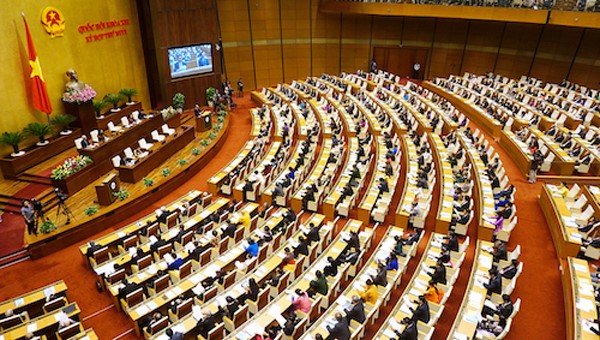(VOVworld) - Domestic religious followers have praised the Vietnamese legislative body’s recent discussion and plan to approve a bill on religions and beliefs at the second session of the 14th National Assembly. Religious dignitaries said the promulgation of such a law at this moment is of particular importance to institutionalize the 2013 Constitution’s provisions on religious freedom and ensure the right to freedom of religion and belief for all.
 |
| The second session of the 14th National Assembly (Photo: baodauthau.vn) |
Vietnam is a multi-religion, multi-belief country. The Party and State of Vietnam have consistently followed a policy of respecting and ensuring the right to practice religion in Vietnam. There has been a harmony between religions here which reflects the motto “Living good lives with good religions”. The draft law on religion and belief is based on a consistent policy and accommodates today's religious activities.
Respecting religious belief
The bill on religion and belief which will be submitted to the 14th NA session for approval goes beyond the previous Ordinance on Belief and Religion.
The biggest change is in article 6, expanding freedom of religion and belief from “citizens” to “everyone”, including the religious and the non-religious.
Priest Tran Van Huynh, Chief Coordinator and Chief of the Standing Committee of the Cao Dai Bach Y, a sect of Caodaism, and a NA deputy for Kien Giang province, said: “In addition to expanding the right to freedom of religion and belief, the bill has interpreted that right as a fundamental human right as set forth in the 2013 Constitution.”
He added: “The draft law has added a new chapter, chapter II on the right to freedom of religion and belief, which demonstrates the Party and State commitment to ensuring freedom of religion and belief for all.”
.jpg) |
| Most Venerable Thich Thanh Quyet at the NAdebate on June 5th, 2016. (Photo: laodong.com.vn) |
Most Venerable Thich Thanh Quyet, Deputy Chairman of the Executive Council of the Vietnam Buddhist Shangha and a NA deputy for Quang Ninh province, said the bill has many regulations on registration and notification to set up a religion to replace the ask-give mechanism. It clearly defines the responsibilities of the state to help religious organizations in international integration, thereby building trust between religious followers and the state.
According to Most Venerable Thich Thanh Quyet, “This law has broadened the previous ordinance, clarifying the procedures for registering religious activities, and operations, shortening the time needed for recognizing a new religious organization from 23 years to 5 years and loosening the requirements for splitting or merging religious organizations.”
For the first time, the right to freedom of religion and belief for foreigners legally residing in Vietnam has been fully recognized. Under the new law, foreigners have the same basic right to practice a religion as any Vietnamese citizen. They are allowed to study at religious establishments in Vietnam, and can be nominated, appointed, or elected to a religious post in Vietnam if they satisfy the set conditions.
Priest Nguyen Van Rien, chief of Phuoc Thanh County, Phu Cuong Roman Catholic Diocese and a NA deputy for Binh Duong province, said: “In 2004 we only had the Ordinance on Belief and Religion. Now we are going to have a Law on Religion and Belief.”
Rien said: “This is a step toward fulfilling people’s aspirations in line with current trends, meeting the requirements of national reform, and creating conditions for religious organizations to enjoy their legitimate rights.”
Empowering religious organizations in medical, educational sectors and social sponsorship
The bill extends activities of religious organizations and their affiliates in the fields of health, education, training, and social sponsorship, and creates conditions for religious organizations to be involved deeper in charity work to exercise their responsibilities in implementing major targets of the country.
Priest Nguyen Van Rien said: “Pursuant to the 2004 ordinance, educational and charitable activities of religious organizations were activities encouraged by the state. Under the new draft law, they are considered a right. These provisions open up opportunities for religious organizations to participate in education and healthcare in the interest of society. Religious organizations will have more ways to develop medical and educational models for the people, thus reducing social burdens and promoting socialization in the medical and education sectors.”
Superior Buddhist monk Ly Minh Duc, Chief of Som Rong Pagoda in Soc Trang city and a NA deputy of Soc Trang province, said: “The draft law on religion and belief will motivate religious followers and dignitaries to embrace the positive aspects of religions and socialism, promote the patriotism of religious followers, and encourage them to resist attempts by hostile forces to distort or abuse religion to sabotage the socialist regime.”
When the bill is approved, it will create a more solid legal foundation for religious activities and encourage religions to contribute more to national development.